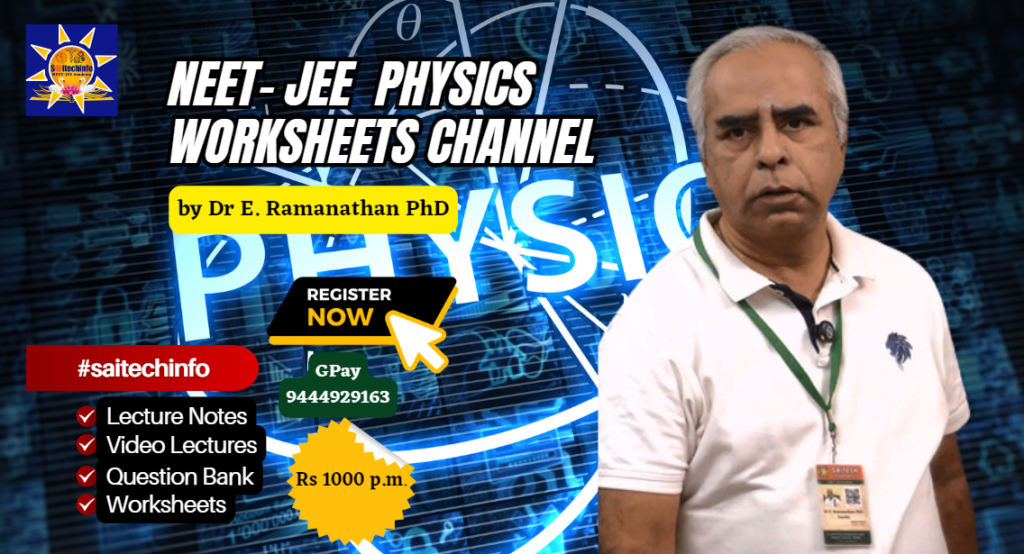
Physics is one of the more challenging subjects for NEET and JEE students, and they struggle with it for several reasons:
- Conceptual Complexity: Physics often requires a deep understanding of abstract concepts such as electromagnetism, thermodynamics, and quantum mechanics. These topics demand not just memorization but also application in various problem-solving contexts. For instance, topics like “Electromagnetic Induction” and “Moving Charges” are common sources of difficulty.
- Mathematical Rigor: Many students find Physics difficult because it involves significant mathematical reasoning. For example, solving problems related to Newton’s Laws, electrostatics, or rotational motion requires comfort with calculus and algebra. Without a strong mathematical foundation, students struggle to connect formulas with real-world applications.
- Application-Oriented Learning: Physics requires an ability to apply theoretical concepts to real-world problems. NEET and JEE are known for their application-based questions, which test a student’s problem-solving skills, not just theoretical knowledge. Videos such as “Problem Based on Centripetal Acceleration” and “Moving Charges” attempt to address this, but students still struggle with applying theory to practical scenarios.
- Lack of Conceptual Clarity: Students often have difficulty visualizing physical phenomena, such as electromagnetic fields or atomic structures. This lack of conceptual clarity makes it harder to understand how various Physics laws work in real-life situations.
- Time Pressure and Stress: Both NEET and JEE have competitive environments, and the time-bound nature of the exams adds to the pressure. Physics often requires multiple steps to solve a single problem, and under time pressure, students may make errors, miss steps, or fail to understand how to approach the problem altogether.
- Inadequate Problem-Solving Practice: Physics is a subject that gets better with practice. The more problems students solve, the better they understand the nuances of different concepts. However, many students do not get enough practice with varied problems, making it hard for them to adapt to different kinds of questions in exams.
Tools such as quizzes on topics like “Biot-Savart Law” and “Magnetic Effect of Current” can be useful for addressing these issues, as they provide focused practice and help reinforce understanding through repetition.
In summary, a combination of conceptual difficulties, mathematical challenges, application-based questions, and exam pressure contribute to students’ struggles in Physics for NEET and JEE.

For NEET Physics, key topics are divided into two major sections: Class 11 and Class 12 syllabi. The exam places strong emphasis on both conceptual understanding and problem-solving ability. Here are the key topics that students should focus on:
Class 11 Physics Key Topics:
Physical World and Measurement:
- Units and Measurements
- Dimensional Analysis
- Error Analysis
- Significant Figures
Kinematics:
- Motion in a Straight Line
- Motion in a Plane (Projectile Motion, Relative Velocity)
Laws of Motion:
- Newton’s Laws of Motion
- Friction
- Circular Motion
Work, Energy, and Power:
- Work-Energy Theorem
- Conservation of Energy
- Power
System of Particles and Rotational Motion:
- Centre of Mass
- Moment of Inertia
- Torque
- Angular Momentum
Gravitation:
- Newton’s Law of Gravitation
- Gravitational Potential Energy
- Motion of Planets and Satellites
Mechanical Properties of Solids and Fluids:
- Stress and Strain
- Viscosity
- Surface Tension
- Bernoulli’s Theorem
Thermodynamics:
- Zeroth, First, and Second Law of Thermodynamics
- Carnot Engine
- Heat Transfer (Conduction, Convection, Radiation)
Kinetic Theory of Gases:
- Equation of State
- Degrees of Freedom
- Mean Free Path
Oscillations and Waves:
- Simple Harmonic Motion (SHM)
- Damped and Forced Oscillations
- Wave Motion
- Doppler Effect
Class 12 Physics Key Topics:
- Electrostatics:
- Coulomb’s Law
- Electric Field and Potential
- Capacitance and Dielectrics
- Gauss’s Law
2. Current Electricity:
- Ohm’s Law
- Kirchhoff’s Laws
- Potentiometer and Wheatstone Bridge
- Electrical Instruments (Galvanometer, Voltmeter, Ammeter)
3. Magnetic Effects of Current and Magnetism:
- Biot-Savart Law
- Ampere’s Circuital Law
- Moving Coil Galvanometer
- Earth’s Magnetism
4. Electromagnetic Induction and Alternating Currents:
- Faraday’s Laws of Electromagnetic Induction
- Lenz’s Law
- AC Circuits
- Transformers
5. Electromagnetic Waves:
- Electromagnetic Spectrum
- Wavefront and Huygen’s Principle
- Speed of Light
6. Optics:
- Reflection and Refraction of Light
- Lenses and Mirrors
- Optical Instruments (Microscope, Telescope)
- Wave Optics (Interference, Diffraction, Polarization)
7. Dual Nature of Radiation and Matter:
- Photoelectric Effect
- de Broglie Hypothesis
- Bohr’s Model of Hydrogen Atom
8. Atoms and Nuclei:
- Atomic Models (Rutherford, Bohr)
- Radioactivity
- Nuclear Fission and Fusion
9. Electronic Devices:
- Semiconductors (Diodes, Transistors)
- Logic Gates
- Zener Diodes
10. Communication Systems:
- Modulation and Demodulation
- Satellite Communication
Highly Important Topics:
- Mechanics (Kinematics, Laws of Motion, Work-Energy-Power)
- Electrostatics and Current Electricity
- Magnetism and Electromagnetic Induction
- Optics (Ray and Wave Optics)
- Thermodynamics
- Modern Physics (Photoelectric Effect, Atoms and Nuclei)
Focusing on these key areas, along with rigorous practice and understanding of concepts, will help students maximize their scores in NEET Physics.